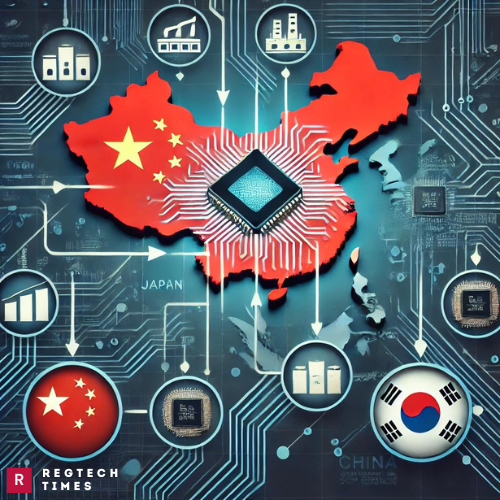A series of semiconductor sanctions imposed by the U.S. is creating significant economic challenges for Asian firms deeply integrated with the Chinese market. These sanctions, which began during the Trump administration and have intensified under President Biden, are aimed at restricting China’s access to advanced semiconductor technology. However, the impact of these restrictions is being felt far beyond China, with major semiconductor players in Taiwan, Japan, and South Korea struggling to adapt to the new regulatory landscape.
Understanding the Reach of Semiconductor Sanctions
The U.S. semiconductor sanctions are reinforced by the Foreign Direct Product Rule (FDPR), which allows the U.S. to control the export of products manufactured outside its borders if they involve American technology. Given the critical role of U.S. technology in the global semiconductor supply chain, this rule has sweeping consequences for businesses worldwide.
The goal of these sanctions is to limit China’s capability to develop advanced semiconductors, which could bolster its technological and military power. While this serves U.S. strategic interests, it has significantly disrupted the operations of Asian semiconductor manufacturers, which depend heavily on the Chinese market for both sales and production.
Taiwan’s Semiconductor Dilemma
Taiwan, a global leader in semiconductor manufacturing, has been particularly affected by these sanctions. The semiconductor sector contributes approximately 15% of Taiwan’s GDP, with companies like Taiwan Semiconductor Manufacturing Company (TSMC) playing a pivotal role in the global market. In 2023, Taiwan’s chip exports to China were valued at over $47 billion. However, U.S. semiconductor sanctions restricting the export of crucial manufacturing equipment have made it increasingly difficult for Taiwanese companies to continue their traditional outsourcing practices in China.
As a result, King Yuan Electronics Co., a leading semiconductor assembly contractor, decided to divest from its Chinese operations in April 2023. Meanwhile, TSMC has accelerated its expansion in the U.S., investing in new foundries in Arizona to reduce its dependence on China and comply with the semiconductor sanctions.
Japan Faces Retaliation Amid Semiconductor Sanctions
Japan, home to key semiconductor equipment manufacturers like Tokyo Electron and Nikon, initially avoided the brunt of U.S. semiconductor sanctions due to its lower reliance on American technology. However, following pressure from the U.S., Japan introduced its own export controls on chip-related equipment and materials in 2023.
In response, China imposed retaliatory measures, restricting the export of critical minerals such as gallium and germanium to Japan, escalating a trade conflict that threatens to impact other industries. Major Japanese companies, like Toyota Motor, have warned of potential negative consequences for the automotive industry, which relies heavily on Chinese raw materials.
Tense Stand-off: China’s Stern Warning to Japan Over Chipmaking Equipment
Furthermore, there are reports that China may further restrict Japan’s access to essential minerals if Japan continues to enforce sanctions on semiconductor equipment sales to Chinese firms.
South Korea’s Balancing Act
South Korean chipmakers, such as Samsung and SK Hynix, are also navigating the complex landscape created by the U.S. semiconductor sanctions. These companies, which are among the world’s largest memory chip producers, have significant manufacturing operations in China. In October 2023, they received special permissions to ship certain manufacturing equipment to their Chinese facilities, which provided some relief to the industry.
Dutch Decision to Impose ASML Sanctions Could Be a Painful Blow to China’s Chip Industry
However, uncertainty persists, particularly concerning a potential future ban on selling high-bandwidth memory chips to China. While China has responded with some retaliatory measures, it has been careful not to push South Korean firms out completely, recognizing their role as significant employers in several regions.
Like their Taiwanese counterparts, South Korean companies are diversifying their manufacturing footprint. For example, SK Group has announced plans to invest $30 billion in the U.S. by 2025 to mitigate the impact of these sanctions.
The Cost of Compliance with Semiconductor Sanctions
The compliance costs associated with U.S. semiconductor sanctions are mounting for Asian firms, resulting in lost revenues and increased expenses related to relocating manufacturing. While companies like TSMC and SK Hynix have benefited from subsidies under the U.S. CHIPS Act, there are growing calls for more substantial support from Washington.
The CHIPS Act of 2022: Revitalizing the U.S. Semiconductor Industry Defying Global Competition
South Korea’s Trade Minister Cheong Inkyo recently highlighted the need for incentives, stating that “for countries or companies complying with the U.S. in good faith, there should be some kind of carrots.” This statement emphasizes the need for a delicate geopolitical balance. If the cost of compliance becomes too high, or if Washington fails to provide adequate incentives, it risks straining relationships with its Asian allies.
U.S. semiconductor sanctions are reshaping the global supply chain, compelling Asian firms to adapt swiftly. As Taiwan, Japan, and South Korea navigate these economic and geopolitical challenges, the future of global semiconductor production hangs in the balance. The outcome of these sanctions will have far-reaching implications, not only for the semiconductor industry but also for broader international relations and economic stability.


